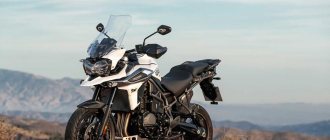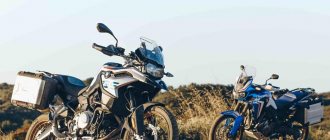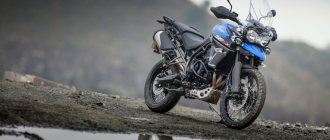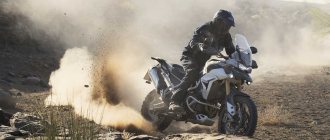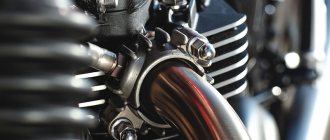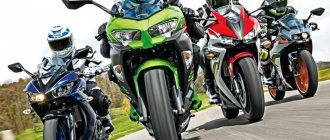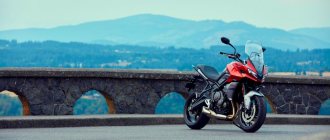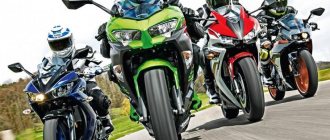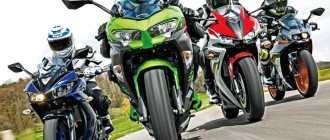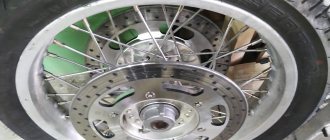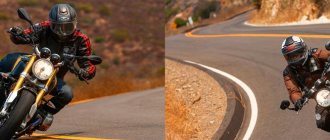RU-MOTO RATING
- Reliability
- Chassis
- Appearance
- Comfort
4.3
Verdict
Triumph Tiger 800 is a model that definitely deserves attention. Of the huge number of advantages, the only thing that confuses me is the cost of the moto. The unsurpassed technical characteristics of the Tiger will be appreciated by true aesthetes who are accustomed to having the best.
The multitasking capability of the model from the British manufacturer instantly captivates with its breadth of capabilities. The Triumph Tiger 800 XC is an ideal unit for both daily travel and long-distance travel. The upgraded 800 cc engine works in symbiosis with the electric throttle, which ensures instant power delivery. Now you can freely cover long distances on a 19-liter fuel tank, as engine efficiency has increased by 17%.
Motorcycle Triumph Tiger 800
Read other motorcycle reviews Great review of the Yamaha YBR 250
This bike is capable not only of highway surfaces, but also of outright off-road conditions. Pilot safety is ensured by an effective braking system and standard hand protection. The three-cylinder engine with a volume of 95 horsepower pulls the engine in any gear.
British motorcycles have an easily recognizable style of their own, which has become a classic enduro design.
Design
The combination of brutality and swiftness was achieved brilliantly by the English designers. The bike is moderately compact in appearance, muscular and aggressive, although it stops looking compact the moment you sit on it. What catches your eye is the detailed elaboration of all the elements, which, when brought together, form a unique, integral appearance, unlike anyone else.
Specifications
Potential buyers expect approximately the same set of qualities from any touring enduro, with reliability usually being the top priority. Nobody wants to be stuck with a broken motorcycle somewhere in the middle of the endless steppe, but the owners of the Triumph Tiger 800 are unlikely to face such a bleak prospect.
Engine
Taking the proven engine of the Daytona 675 model , the engineers slightly derated it, increasing its volume and torque. The result of their work was a liquid-cooled in-line “three” , which brutally pulls the bike forward from low revs, and maintains confident dynamics right up to the very top. Maximum power – 95 hp. , torque – 79 Nm . The engine is very economical thanks to different operating modes and multi-point fuel injection. The motorcycle is capable of accelerating to speeds of over 200 km/h , reaching the first 100 km/h in just under 5 seconds .
Transmission
The 6-speed gearbox works perfectly, but is sometimes quite noisy, a bit reminiscent of Ducati motorcycles. At the same time, it can only be broken intentionally, and the current gear is always displayed on the dashboard. The top of them, the sixth, serves mainly not for acceleration, but to reduce fuel consumption at cruising speed - very convenient.
Chassis and brakes
The three-cylinder engine is inserted into a steel frame , which rests on long-travel Showa suspensions . An inverted fork is installed at the front, a light-alloy pendulum with a shock absorber is installed , and a full set of adjustments is included in both. Braking is handled by two 305 mm discs at the front with Nissin calipers (2-piston) and a 255 mm disc with a 1-piston caliper at the rear. ABS was previously offered as an option, but from 2021 it is included in all trim levels, and can be disabled if desired.
Electronics
The first generation of the motorcycle had few electronics, but starting in 2015, some auxiliary systems were added to the design. Now the bike is equipped with many auxiliary systems, some of which are included in the basic package, and some are offered as additional options.
Weight and dimensions
The curb weight is 210-215 kg , depending on the modification, excluding additional body kit. The center of gravity is high, so you need to tilt the bike carefully - it passes the point of no return quickly, after which it falls on its side with a roar. It is extremely comfortable to drive, especially in the city - the high-seated pilot gets an excellent view over the roofs of most cars, and the width of about 80 cm makes it easy to squeeze between cars.
Controllability
The bike handles great , but it has its own characteristics. It is not very willing to take sharp turns at high speed, so it has to be leaned with force. However, you can quickly get used to this, as well as to the fact that the steering angle is small, which can make maneuvering in a garage or parking lot difficult if you are not used to it.
Fuel consumption
On average, gasoline consumption does not exceed 5 liters when driving at a cruising speed of 120-140 km/h . The presence of a high windshield, a passenger and fully loaded panniers leads to an inevitable increase in this figure, but still the power reserve remains very decent, since the gas tank fits as much as 19 liters .
Life of Pi: test drive Triumph Tiger 800 XCa 2021
A motorcycle with the name Tiger under the Triumph brand appeared in the late thirties. Of course, there was no talk of any enduro, much less a crossover or, God forgive me, a tourenduro, back then, in general, every motorcycle had to be able to ride on both asphalt and dirt roads. Much water has passed under the bridge since then, but following the revival of Triumph, the name Tiger began to thunder again.
First, in the distance, when the first 900s on spokes with , then full-fledged liters appeared... In 2010, following the motorcycle fashion, a division took place in the “Tiger” family into “large” and “small”, with an ageless “ medium" Tiger 1050, which today is sold under the name Tiger Sport. We have already talked about the “big” Tiger 1200 Explorer, and now, following the 2021 update, it’s the turn of the “small” 800 cc device.
Video version of the Triumph Tiger 800XCa 2018 test drive:
In general, I had the chance to meet it almost in 2011, when the device was completely new, and, I must say, it made a good impression, although it turned out to be very asphalt. It was all the more interesting to see the updated Tiger 800 XCa, which the importer himself calls “an uncompromising touring enduro.”
From the outside, the device is similar to a tourenduro: steel arches, aluminum engine protection, a screen on the radiator, LED foglights with aluminum trims, a high windshield, mugs on the steering wheel, spokes and an indispensable attribute of a nomad - a “goose” beak... But...
Radiator protection, engines and arches as standard - the prerogative of the XCa version
Tell me, a simple guy from the outskirts, riding a motorcycle in the real world, how an “uncompromising tourenduro” can be so sweet: an all-LED headlight with the most magnificent running lights, a color digital dashboard, a joystick on the remote controls, and this coloring?! I assure you, colorists will come out of the window if you happen to ask them to choose this color. But scratches on uncompromising tourenduros are the norm of life, without which not a single serious trip can do!
It’s only in Hollywood action movies that pumped-up heroes don’t swear when a couple of bullets fly at them; no matter how much they jump and crawl, their costumes never show wrinkles, dirt or sweaty armpits. Tiger 800 XCa is just as dazzling, it fits just as amazingly into any landscape and frame, but only while there is a whole staff of washers, polishers and other people with cardboard cups in their hands.
The new, all-LED headlight looks impressive, but it’s a shame to drown it in the mud
But if you don’t cling to the word “uncompromising” and look at the real owners of such motorcycles, then everything will fall into place. How many “Geliks” have driven off the asphalt in Moscow, not counting parking on the lawn? Most of us buy a tourenduro as a motorcycle for every day, for commuting to work and riding around the city, and it was for them that the Tiger was created.
Don't believe me? Just sit in the saddle and appreciate! Every detail captivates the design, every key on the remote control, which, by the way, is now backlit. By the way, the ergonomics are also excellent - everything is convenient, neat and pleasant. The dashboard is a separate reason for the owner’s pride: colorful, elegant, informative and with its own feature: the owner can choose one of six design themes, changing the tachometer scale, the size of the speedometer digits and “playing” with other scales. The future is already here!
The dashboard has an adjustable tilt angle and the ability to choose one of six design themes
Running out of gas? The scale turns red. The engine hasn't warmed up? Get a frosty blue ribbon! Are the revs approaching the red zone? The entire tachometer scale turns red. And all this is quite readable even in sunny weather, and if there is still glare, it won’t take long to change the angle of the dashboard, there’s such a trick here too. I am sure that the next stage of motorcycle evolution will come down to the projection of all the same things, but on the visor of a helmet.
There is also a windshield with convenient mechanical height adjustment, the ability to select the height of the driver’s seat, which, by the way, is quite high even in the lower position - a feature of the XCa version. For shorter pilots there is an asphalt version, but the test device is designed mainly for tall riders.
Mechanical glass height adjustment is simple and convenient.
The XCa version is top-end, with factory options everywhere: the pilot and passenger seats are heated separately, and the steering wheel grips are also heated. They also have the most convenient button located right on the left grip - a wonderful solution that, besides Triumph, only Harley-Davidson has thought of, although the switch is located at the end of the handle.
Otherwise, the design has not changed too radically - the same steel frame, woven from intricately bent steel pipes, the same beak, an attribute of the XC version, the same rear LED light and turn signals, which now turn off automatically. The engine hasn’t changed much either – a 12-valve 800 cc “three” produces 79 Newton-meters of torque and 95 horses.
The ability to customize the operation of all motorcycle systems to suit your needs is the main feature of the new product.
Interestingly, the competitors BMW F850GS and Honda Africa Twin engines produce the same 95 horsepower. Coincidence? I don’t think so; rather, it smells like some kind of cartel agreement, or, if you like, a gentleman’s agreement. In any case, peak values are only half the story, what is more important is how the power curve is spread across the entire rev range. And here the “Tiger” is strikingly different from the same “Africa”.
The in-line “three” has an absolutely asphalt character, so there is indecently little torque at the bottom, but as soon as the tachometer gets close to three thousand, the Briton begins to lay out his trump cards on the table. Where competitors would have merged long ago, Tiger is just beginning to accelerate. For asphalt this is what you need, but on an intersection it’s the opposite.
Three cylinders in a row, 900 cubic meters and 12 valves - a direct competitor to the Yamaha MT 09 Tracer, but only on paper
Firstly, in muddy mud you need a lot of torque at the bottom, instead of which you get either slipping of the rear wheel or a stalled engine. Secondly, even on a dry primer, you want pulsations and smooth output from the engine for confident cornering in a controlled drift, and the “row” spins up quickly, sending an avalanche of power to the rear wheel, tearing the rear wheel into an uncontrollable slip.
And even though the gears in the gearbox are amazingly selected, and even a child can squeeze out a wet clutch with a cable drive, it’s impossible to drive off-road really fast in a Tiger. However, this is the only drawback, which is more than compensated for by excellent suspension, correct wheels and an abundance of safety electronics.
It is on the asphalt that the full potential of the British triple is revealed
There are as many as six modes here, designed for any conditions, including Off Road Pro, where everything is turned off, and the rider can only rely on himself. There is also “simply” Off Road, where traction interferes minimally, and ABS looks after only the front wheel, but the main thing is the sixth, the user mode allows the pilot to adjust the sensitivity of stabilization, anti-lock and engine response to the throttle directly to suit himself.
“Tiger” has something else in stock - a feeling of extreme lightness. The tall, almost liter crossover weighs only 208 kilograms in running order, but it doesn’t even feel like it! In combination with chamber spoked wheels of the “correct” size of 21 and 17 inches and a wide handlebar, it feels, especially on difficult off-road, like a light single-cylinder enduro.
From this angle there are not many changes, although the motorcycle has been radically updated
We were also pleased with the suspension: the WP fork with 220 mm of travel handles unevenness perfectly, the rebound and compression adjustments are spread across the stays, and you can adjust them even with thick gloves. Alas, the thickness of the pipes is only 43 millimeters, so the shifter lacks a little stiffness on asphalt, but overall it’s not bad there either.
There were no questions about the rear suspension either - the adjustable WP shock absorber with a remote reservoir, in combination with an aluminum pendulum and a stroke of 215 millimeters, perfectly handles all bumps and landings from small springboards.
The suspension adjustment knobs can be adjusted even with thick gloves - convenient!
But the brakes are not so outstanding - a pair of Brembo two-piston floating calipers confidently settle the motorcycle, but the information content is lame, and the linearity of the response is lacking. However, everything is within the bounds of decency, the braking distance is predictably short, and the electronics do not sleep, providing insurance if necessary.
On the asphalt, the “Tiger” feels even better than on the “crossroads” - it steers predictably and pleasantly, you can lean into turns deeply, and shift effortlessly. Here the need for the “lower end” of the engine disappears; the closer to the cutoff, the more interesting it is to drive. The dynamics are not bad, although the device is in no hurry to hit the rear wheel even with the traction control turned off.
A pair of Brembo floating calipers work well, the expected braking distance is quite consistent with the actual one
The habits of the Tger 800 XCa are noble in the British way, no bad manners, but no punk rock either, quiet, decorous and calm. Ideal for driving around the city. And don’t let the height of the saddle along with the width of the steering wheel confuse you - the handles go above most mirrors of passenger cars, and the steering angles are decent, which, combined with the ease and the ability to go around this or that plug on the sidewalk, makes moving even during rush hour simple and relaxed.
An ideal crossover for the city and surrounding areas, a good choice for traveling, including on very rough roads, but the “little Tiger” does not deserve the title of an uncompromising tourist enduro - it is too asphalt, too refined for serious off-road adventures.
With the appropriate skill, the Tiger 800 will not let you down even on serious rough terrain.
And yes. If you liked the “old” Tiger 800, drop everything and run for a new one, because the current generation device has become better than the previous one in everything, but if you are looking at a touring bike for severe off-road use, take a test drive of the new F850GS, Africa Twin and... Wait for the appearance KTM 790 Adventure, which according to rumors should be shown this fall. Competition for buyers in this market segment is fiercer than ever, so the choice will not be easy.
Photos of Triumph Tiger 800XCa:
We thank the Granmoto motorcycle dealership for providing us with a motorcycle for testing.
Accreditation and organization of test drives – Denis Sokolov | | +7 (999) 851-49-71
Motorcycle price
The cheapest used copies cost from about 400,000 rubles , but you shouldn’t rely on this figure - the bulk of the options offered still start at 500-550 thousand . And you can become the owner of a brand new bike of the latest model year, under warranty, for just over a million rubles. But you will have to service it at dealers in order not to lose the warranty, and this is not cheap.
Repair and tuning
Any modern technology is quite complex technically. The Triumph Tiger 800 is reliable, but some repair operations on it require good skills and special equipment. However, this is not too burdensome for the owners - problems with this model are rare, and maintenance can be done on your own.
Repair
Most of all operations can be done independently, but not all. In general-purpose motorcycle services, employees are not always familiar with the specifics of English motorcycles, so contacting official dealers would be the best option. But in this case, you will have to shell out money - their prices cannot be called low.
Spare parts
You can bring anything you want through the above-mentioned dealers, and they almost always have various small parts and consumables in stock. Non-original spare parts are found on sale, both European and Chinese. Prices vary greatly, as does quality.
Tuning
The manufacturer offers a solid selection of tuning for all occasions. There are windshields, heated grips, other seats, trunks, and in general everything your heart desires. Third-party companies are also not lagging behind, and their analogs are usually cheaper than the original, and are often not inferior in quality. So you can tune almost anything in the Triumph Tiger 800, if you only have enough money and imagination, but installing all the additional options at the dealer will easily add 20-25% to the price of the motorcycle.
Additional tuning Triumph Tiger
The maximum curb weight allowed by the manufacturer is 435 kg, which means that it is possible to equip the vehicle with additional equipment:
- Travel case for equipment on the rear platform;
- Engine arcs;
- Fog lights;
- Crankcase protection;
- Center stand;
- Electric heating and hand protection;
- Protection from dirt from under wheels, etc.
Additional components for the Triumph Tiger 800 XC motorcycle
Additional equipment is selected at the discretion of the equipment owner, which allows to improve the quality and aesthetic characteristics of the enduro.
Motorcycle modifications
There are several versions of the Triumph Tiger 800, one of them is more “tailored” for off-road use, and the other for asphalt roads. They differ in wheels, suspensions and some body kit elements.
- XC . The bike is great for riding over rough terrain, but without fanaticism - it’s still better not to get into swamps and liquid mud.
- XR . A more “parquet” version, designed for driving on asphalt. Any quality, but still asphalt.
Since 2021, the classification has changed slightly. Now road models include XC, XRx. XRx LOW and XRT, and for off-road - XCx and XCA. The latter are distinguished by longer-travel Showa suspensions and a “21” instead of “19” front wheel.
STABILITY SYSTEM
Triumph cares about safety, so all models of the Tiger 800 family are equipped as standard with the company's advanced stability control system - Triumph Traction Control (TTC). This system helps restore traction in wet and slippery conditions by detecting rear wheel slip and reducing engine power until traction is restored.
The TTS system has three settings: ROAD - optimal mode for public roads, with minimal slipping of the rear wheel; OFF ROAD - off-road setting, the degree of slippage is noticeably increased (only for Tiger 800 XCx, XCa and XRx, XRt versions); OFF - Stability control is disabled in this mode.
Advantages and disadvantages
The Tourenduro must meet certain requirements traditionally imposed on motorcycles of this class. If everything is in order with them, then you can put up with minor shortcomings, and the Triumph Tiger 800 is just such a case. This bike isn't perfect, but it's really good, and it does what it was designed for very well.
Advantages
- Excellent traction throughout the entire rev range , from the very bottom. And the acceleration dynamics are maintained up to 160 km/h.
- Assistance systems make life a lot easier. The latest generation is equipped with ABS, traction control, cruise control, different engine operating modes and other nice things.
- The comfortable standard seat of the Triumph Tiger 800 is easily adjustable in height.
- The instrument panel is easy to read in any conditions, both in bright sun and dark at night.
- High power reserve , which is extremely important for touring enduro.
Flaws
- According to many owners, the muffler is , heavy and with a strange exhaust sound. Many people change it to a tuning one.
- Some spare parts are difficult to find in stock, although consumables and other small items are usually available. At least in large cities.
- The official tuning is not noticeably thick, and the prices in it are enough to make a thrifty Russian biker turn grey. Fortunately, there are plenty of non-original analogues.
- Large turning radius . Mainly due to the steering angle limiters.
- Dirt from the road flies directly onto the driver's feet.
Off the asphalt
Now the most interesting thing is the behavior of the motorcycle off the asphalt. Here it becomes clear why the creators “attached” the Tiger 800XC with such a wide and uncomfortable steering wheel in the city. Thanks to its size, the motorcycle is under complete control on the ground. The suspension handles bumps exactly as much as a touring enduro needs. The main thing here is not to forget that the Tiger is a touring car, and not a hard enduro. The fact is that severe off-road conditions can have a detrimental effect on the plastic and optics of a motorcycle. And all this is very expensive. You should be especially wary of stones (and curbs in the city), since the engine crankcase protection does not cover the rear suspension linkage system.
But, in fact, the Tiger 800 XC behaves very well off the asphalt, fully consistent with its positioning. And if you replace the base tires with “toothy” ones, then the off-road potential will come very close to full-fledged two-wheeled “rogues”.
As for the asphalt version, it is also impressive. Therefore, it is not surprising that it was the Triumph Tiger that knocked off the throne the seemingly indestructible “Bavarian” F 800 GS.
Owner reviews
I switched to the Tiger from Golda 1500, at first I was worried that the comfort would be lacking due to being unaccustomed to it, but the first trip dispelled all doubts)) I bought the bike from a dealer new in 2014, immediately bought higher glass plus Motech saddlebags, drove it around Moscow for a couple of weeks and I went on a long drive to Scandinavia, almost 13,000 km in total. The motorcycle behaved perfectly, you can ride for 12 hours without getting tired, the seating position is excellent, and so are the suspensions. Since then, the number on the odometer has grown to 77,000 km, without any breakdowns or repairs, other than what is provided in the manual. Actually, I service it strictly according to the manual, which is probably why I drive without problems. Once I noticed oil fogging on the crankcase, but then for some reason it went away. Dmitry, Moscow.
It’s an excellent bike for long trips, consumption on the highway in quiet mode is no more than 5 liters, I usually take my wife and cargo in three panniers with me on board. Adjusting the height of the saddle is very helpful - with my height, like a hobbit, it’s more comfortable when it’s at the bottom level, but with a load and a passenger the bike sags, it even becomes uncomfortable, so I lift it up. The difference seems to be only a couple of cm, but it really helps. This is in the bike and makes me happy, everything is thought out to the last detail, everything is for the people. Semyon, Irkutsk.
It’s better not to go off-road, the bike is heavy, the center of mass is high, so you can easily drop it. I didn’t even try, I installed purely road tires, not even universal ones, you can safely ride on them on asphalt of any degree of degradation, and on primers too. Triumph Tiger 800 is a very durable motorcycle, but requires maintenance. It’s impossible to knock him down just by driving hard, but with crooked hands it’s easy. Boris, St. Petersburg.
Similar models
- BMW F800GS . A proven Bavarian bike over the years, now out of production. More precisely, replaced by the improved F850GS model.
- Honda VFR800X Crossrunner . A slightly “parquet” tourenduro, designed more for poor asphalt than for dirt tracks. Reliable, tenacious and unpretentious.
- Yamaha MT-09 Tracer , aka FJ-09 . A modern and technologically advanced motorcycle for traveling in almost any conditions.
FAQ
- I heard that this model is being assembled not in Europe, but in Asia, but I couldn’t find any information anywhere. How is it really? The Triumph Tiger 800 is assembled in Thailand, at a plant in Bangkok. But thanks to strict quality control, everything is in perfect order.
- Is there a big difference between the parquet and off-road versions? The difference is noticeable, but not critical. Even the “parquet” modifications are quite capable of handling dirt tracks and graders, and the “rogues” feel great on asphalt.
- They say that the first two generations are very gluttonous. This is true? Not really. But models released in 2015 or later have indeed become much more economical (according to official data - by 17%) thanks to electronic throttle control and different engine operating modes.
Conclusion
The Triumph Tiger 800 completely refutes the prevailing stereotypes about the breakability of English motorcycles. The ancient traditions of one of the oldest motorcycle manufacturers in the world gave it a stylish design , strict but modern, and experienced engineers designed one of the best engines in its class . Add here durable and energy-intensive suspensions, thoughtful ergonomics and high reliability , and you get a bike that will never let you down even on the longest journey. Alone or with a passenger, with or without cargo - this British gentleman will take you anywhere, even to the ends of the world, and will do it in style, with comfort and all possible pleasure.
Specifications
| Maximum engine power: | 95 HP |
| Torque: | 79 Nm |
| Working volume: | 799 cm3 |
| Motor type (cylinder arrangement, number of strokes): | Daytona 675 |
| Number of cylinders: | 3 |
| Number of valves: | |
| Intake type (Injector / Carburetor): | |
| Bore and stroke: | |
| Starting system (Electric starter, kick starter): | |
| Maximum speed in km/h: | 210 km/h |
| Cooling system: | Liquid |
| Transmission (gearbox): | Mechanical 6-speed |
| Clutch (Dry / Wet): | |
| Drive unit: | Chain |
| Frame: | Steel spatial |
| Chassis | |
| Suspension (front/rear travel): | |
| Brakes (Front/Rear): | |
| Wheels / Tires / Rubber: | |
| Dimensions and weight | |
| Dimensions (Length / Width): | |
| Seat height: | |
| Ground clearance: | |
| Curb weight: | |
| Wheelbase: | 1530 mm |
| Weight: | 210-215 kg |
| Fuel tank capacity: | 19 l. |
| Battery capacity: | |
| Year of release: | |
| Country of Origin: |
Verdict
Triumph Tiger 800 is a model that definitely deserves attention. Of the huge number of advantages, the only thing that confuses me is the cost of the moto.
In general we have:
- Informative dashboard with LCD display;
- Powerful and economical engine;
- The Daytona-derived transmission delivers quick, smooth shifts;
- Additional equipment allows you to increase the ergonomics of the model.
The unsurpassed technical characteristics of the Tiger will be appreciated by true aesthetes who are accustomed to having the best.
